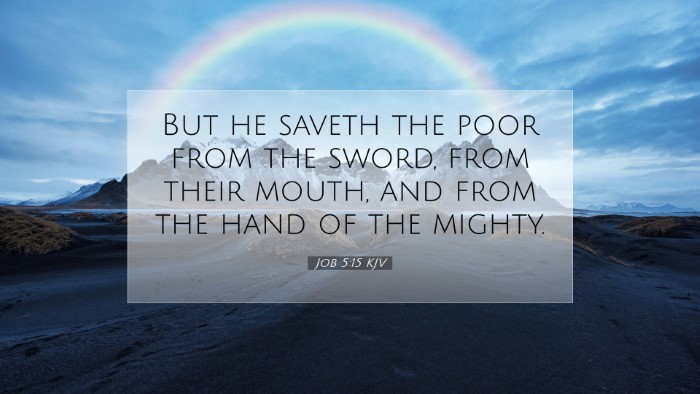Old Testament
Genesis Exodus Leviticus Numbers Deuteronomy Joshua Judges Ruth 1 Samuel 2 Samuel 1 Kings 2 Kings 1 Chronicles 2 Chronicles Ezra Nehemiah Esther Job Psalms Proverbs Ecclesiastes Song of Solomon Isaiah Jeremiah Lamentations Ezekiel Daniel Hosea Joel Amos Obadiah Jonah Micah Nahum Habakkuk Zephaniah Haggai Zechariah MalachiJob 5:15
Job 5:15 KJV
But he saveth the poor from the sword, from their mouth, and from the hand of the mighty.
Job 5:15 Bible Commentary
Commentary on Job 5:15
Verse: “But he saves the needy from the sword, from the mouth of the mighty, and from their hand.” (Job 5:15)
Introduction
This verse is part of Eliphaz's speech, where he reflects on God’s justice and mercy in the face of human suffering. It highlights the theme of divine intervention and protection for the oppressed, illustrating God's role as a savior to those who are vulnerable. Eliphaz, as a representative figure, encourages Job to understand his plight in light of God's overarching wisdom.
Insights from Commentaries
-
Matthew Henry:
Henry emphasizes that God's providence prevails against the threats posed by the oppressors. He notes that the sword symbolizes calamity and violence, while the "mouth of the mighty" represents those in power who seek to harm the innocent. Henry reassures believers that God is ever-ready to deliver the needy from such dire situations. He highlights that this verse serves as an encouragement to all who face injustices, reminding them of God’s faithfulness in delivering His people. The broader context of Job shows that even in suffering, there is hope in a divine rescue.
-
Albert Barnes:
Barnes provides a theological reflection on the neediness of humanity, suggesting that all are vulnerable to external pressures and attacks. He focuses on God’s saving power and His ability to thwart the designs of the wicked. In his view, this verse underscores a profound truth: that God not only observes our struggles but actively intervenes. Barnes believes this verse should be a source of comfort, particularly to those encountered injustices, for it confirms that God acts on behalf of the oppressed. Furthermore, Barnes connects this notion with the broader biblical narrative, where God consistently favors the marginalized.
-
Adam Clarke:
Clarke’s analysis delves into the language used in this verse, suggesting a robust interpretation of the "sword" and the "mighty." He mentions that the sword may represent varied forms of affliction, including social and economic challenges. Clarke elucidates that the “mouth of the mighty” implies the spoken threats and proclamations that often precede persecution. He emphasizes God’s power to save not just from physical dangers but also from despair and desolation. His commentary highlights the assurance that comes from knowing that even when the situation seems hopeless, God is present and active in the lives of those who are in distress.
Theological Implications
The theological implications of Job 5:15 are profound. The act of saving is central to the nature of God, affirming that God is a protector. This assurance of salvation speaks to the character of God as just and merciful. The verse implies that while suffering is a part of the human experience, God's intervention signifies hope. It invites pastoral leaders and theologians to remind congregations that despite life's adversities, God is actively engaged in the world, saving and preserving those whom the world often overlooks.
Applications for Believers
-
Comfort in Distress:
When believers face trials, whether physical, emotional, or spiritual, this verse stands as a reminder of God’s unwavering commitment to deliverance. Pastoral care can utilize this passage to offer hope and reassurance to those struggling with adversity.
-
Encouragement for Social Justice:
This verse resonates with the call for social justice and advocacy for the marginalized. By highlighting God's concern for the needy, it encourages believers to reflect God's nature through their actions, empowering them to support those in need. The church has a role in standing against the powers that oppress the vulnerable.
-
Trust in God’s Deliverance:
Believers are challenged to trust in God's timing and methods of deliverance. Faith can often be tested during calamities, but reminded here is the truth that God does save from both immediate and long-term suffering, thus deepening one’s reliance upon divine mercy.
Conclusion
Job 5:15 serves as a powerful testament to God’s character and His relationship with humanity. Through the reflections of Eliphaz and the insights shared by notable commentators, we gain a deeper understanding of the divine protection that transcends earthly struggles. For theologians, students, and pastors alike, this verse invites them to contextualize human suffering within the assurance of God's faithfulness.


